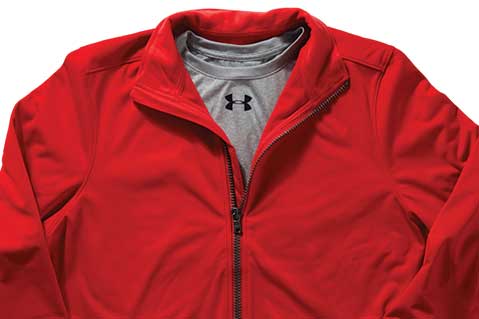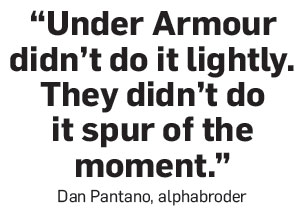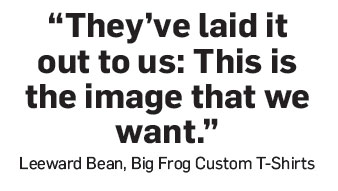Awards January 03, 2017
Under Armour Quietly Entering Promotional Products Industry
Long sought by distributors and end-buyers, Under Armour is finally entering the industry in a coordinated manner. So why don’t you know about it?
Under Armour and alphabroder (asi/34063) launched an exclusive partnership a year ago. Such alliances between retail brands and industry suppliers are commonplace, but in this case, few are bigger. Under Armour is a branding titan that ranks as the third largest sportswear brand in the world. It spent nearly $420 million last year just on marketing. Then there’s alphabroder, the industry’s largest supplier and the sole promo product resident in the exclusive $1 billion club. Combined, the two have the size and spending power to usher the Under Armour brand into the industry with the force of an oncoming running back.

It hasn’t happened that way. In fact, the companies have publicly treated the availability of Under Armour product (a proposition that end-buyers and distributors have endlessly pined for) like a closely-guarded secret. Under Armour hasn’t uttered a thing – no official announcement or press release, no casual earnings call mention. And alphabroder doesn’t even list the brand on its website. One year after the two companies introduced the partnership, just a limited number of distributors have been given access to sell the Under Armour collection.
Why?
 hamberlain Marketing Group (asi/160501) began carrying Under Armour in August 2015. At the time, the Taylor, MI-based distributor scrounged up inventory wherever it could find it: golf pro shops, local reps, industry outlets. “It was sketchy,” says Rob Ross, COO and VP of operations for Chamberlain. “It was a disaster.”
hamberlain Marketing Group (asi/160501) began carrying Under Armour in August 2015. At the time, the Taylor, MI-based distributor scrounged up inventory wherever it could find it: golf pro shops, local reps, industry outlets. “It was sketchy,” says Rob Ross, COO and VP of operations for Chamberlain. “It was a disaster.”
His experience wasn’t unusual. For years, buying Under Armour was like squeezing Flubber – once you thought you had a good grip, it would slip out of your hand. Fluctuating inventory and scattered product availability was the norm. The brand’s small roster of industry vendors was oddly diverse: suppliers of varying niches, team dealers with added corporate business, “corporate and ASI dealers” that were required to have a brick-and-mortar storefront. Under Armour’s “All-Access” dealer page directed corporate uniform buyers to Merchology (asi/169169). (The distributor declined to speak to Counselor for this article.) Organizations and small groups could also submit a request to buy products directly through Under Armour.
RETAIL NEXT
The success of Under Armour once again proves the ability of retail brands to thrive in the promotional products industry. Here are other headlining brands that distributors and buyers are desperate for.
- Yeti: Now available through Premco Associates (asi/79373), the Yeti line of coolers and vacuum-insulated tumblers has inspired imitators but left countless clamoring for the real thing.

- Lululemon: The athleisure forerunner would be a massive hit with buyers of all ages and fitness levels.

- Tory Burch: Capsule collections from high-end accessory designers have created a frenzy at box stores such as Target and Kohl’s. Similar collections in the promo industry would be well received.

Meanwhile, inside the brick walls of its waterfront headquarters in Baltimore, Under Armour was hatching a plan to rectify all that. “I think it was a matter of priorities,” says Dan Pantano, president of alphabroder, about Under Armour’s previous lack of a concerted entry into the promotional product industry. “They had so many other opportunities for growth, be it international expansion, other product lines, etc.” The company spent two years analyzing the industry and sizing up potential partners. Alphabroder and Under Armour began talks in early 2015. “They didn’t do it lightly, they didn’t do it spur of the moment,” Pantano adds. “They went through a rigorous diligence process before ultimately deciding to enter the channel through alphabroder.” (Under Armour – notoriously selective in its press commitments, where only CEO Kevin Plank is quoted in articles and interviews – declined through alphabroder to speak with Counselor.)
The companies agreed to jointly design a full corporate collection that has expanded to 56 products. Only select alphabroder distributor clients (top-revenue generators or premium goods buyers) would be granted the chance to sell it. Initial distribution would be limited and then gradually expanded; Pantano says currently hundreds of alphabroder customers sell Under Armour. “This isn’t about going out and driving up revenue,” says Pantano. “It is focused on the corporate market, and it is very important to continue to protect the integrity of the UA brand. That is why distribution is still limited in this channel.”

The brand. It’s the quality Under Armour values above all else. And not surprisingly, it’s the common thread in the partnership with alphabroder. “Brand integrity is one of their top priorities that Under Armour has communicated to us,” says David Clifton, alphabroder’s chief marketing officer. Alphabroder’s executives believe, for example, that the company’s in-house decoration capabilities – which allow the supplier to keep a tight grip on appropriate end-user branding and decoration quality – gave the supplier a significant leg up in securing the partnership. (Alpha- broder does not sell Under Armour blanks, so it reviews, approves and prints every logo. In certain cases, Under Armour itself will approve branding.)
Distributors, too, have a similar mandate – not only reinforced by an agreement they must sign (the only written agreement mandated for alphabroder brands), but also the explicit trust being placed with them. “We essentially become an extension of [Under Armour]. We’re the ambassadors,” says Liz Bone, merchandising manager for online distributor Logo Sportswear (asi/255448). “We want to make sure we are putting the extra effort in representing them the way they would want.”
That means, among other things, exercising strict control over what is put on Under Armour garments. Anything under the ATF’s (The Bureau of Alcohol, Tobacco, Firearms and Explosives) purview is an automatic no. If it’s unseemly, it’s out. “They’ve laid it out to us: This is the image that we want,” says Leeward Bean, founder and CEO of Big Frog Custom T-Shirts, a franchise apparel shop and Under Armour-approved decorator with 84 locations in the U.S. “What alpha tells us is, if you have that sinking feeling in your heart that ‘Gee, they’re really not going to like this,’ then don’t do it.”
What is the brand image that Under Armour wants with promotional product buyers? Bean says it’s wholesome and upscale. “I don’t think they’re looking for what we call the ‘bikers, bars and bands’ type of business, which is [typically] good business for us,” he adds.
To use another term that the brand readily incorporates into its product lines, Under Armour is elite. “It’s performance, it’s integrity, it’s effort,” Clifton says. “The Under Armour brand stands for so many positive things.”
 n many respects, Under Armour is like other major retail brands in the promotional product industry. For one, prices are set at a premium, and not surprisingly, order sizes fall on the smaller end of the spectrum. Customers will seek it out by name, and willingly pay the higher price it commands.
n many respects, Under Armour is like other major retail brands in the promotional product industry. For one, prices are set at a premium, and not surprisingly, order sizes fall on the smaller end of the spectrum. Customers will seek it out by name, and willingly pay the higher price it commands.
But there are differences as well. Alphabroder’s collection is surprisingly broad; it includes popular sellers like polos and performance tees, but also wovens and outerwear as well as duffel bags and a variety of hats. “Unlike some athletic brands you see in the space that are really more golf-centric, this is truly designed and will continue to be developed for the corporate market,” says Pantano, whose company also sells Adidas Golf products.
RIPPED FROM THE HEADLINES
As one of the largest global brands in the world, Under Armour is always making news. Here are the latest headlines for the brand, and what their impact will be.
“Under Armour Inks Deal to Place Logo on Front of MLB Jerseys” – Bloomberg
With a new mega-deal to manufacture Major League Baseball uniforms, training gear and licensed apparel beginning in 2020, Under Armour is pushing its brand visibility even higher – and increasing its cross-promotional licensing opportunities.
“Kevin Plank Is Betting Almost $1 Billon That Under Armour Can Beat Nike” – Inc.
The company is making a massive investment in wearable technology to propel the brand into the future. There are no current plans to bring such tech to the industry, but alphabroder executives won't discount anything if the wearable tech category continues to grow.
“Under Armour Shares Slide as Growth Forecast is Tempered” – The Wall Street Journal
The company lowered its long-term growth forecast in its latest earnings report, sending a ripple of doubt among followers of the bulletproof brand. Increased competition from Adidas and major sporting goods store closings are affecting Under Armour, but Plank still notes the company is outpacing its industry in growth.
It matches the evolution of Under Armour into something more than just an athletic brand – one that also pulls in younger buyers and casual wear fans. Chamberlain’s Ross notes Under Armour’s unique ability to penetrate hunting and fishing markets. “You can’t really find anything hunting and fishing through Adidas and Nike,” he says. “That’s a huge demographic of people that Under Armour specializes in and a lot of ASI distributors service.”
Under Armour and alphabroder may be reluctant to shout their news from the rooftops, but lucky distributors haven’t been as shy. Big Frog locations proudly display Under Armour banners in their windows. Logo Sportswear touts it prominently on its website, and quickly integrated the brand into all of its digital marketing efforts.
Not surprisingly, the sales have been strong and the reaction from customers exceedingly favorable. Big Frog didn’t even set goals this year for Under Armour after not being sure it would carry the brand, but after seeing the results, “This year we’ll do a concentrated effort on the corporate accounts just for Under Armour,” Bean says.
In just five months of carrying the brand, Logo Sportswear says it now accounts for up to 5% of the company’s total sales. The availability of the product not only drives traffic, but influences the sales of other products. “If they don’t meet some of Under Armour’s restrictions, they will switch to other high-end brands that are pretty popular,” says Jeff Martin, VP of marketing for the company.
For alphabroder, Pantano says the first year has “exceeded expectations.” The commitment of inventory by Under Armour and the mechanisms put into place by alphabroder has shifted the way the brand is positioned in the industry. “It’s a big change for the customer who was getting it piecemeal or acquiring it but not in any predictable or repeatable manner,” says Clifton. “Now they can actually put it into programs. They can plan for it. They can really sell it. All of that really added to the momentum behind [the brand’s success].”
But don’t expect one successful year to alter the plan. The companies will expand access and product assortment (with additions to the collection twice a year), but at the same controlled pace it’s laid out from the beginning. It won’t be on alphabroder’s website. It won’t be available to everyone.

That doesn’t mean they are skeptical of the brand’s success on a larger scale. “I think it has the potential to be one of the biggest retail brands in our industry over time,” Pantano says. “It is clearly a very desirable brand in the corporate market.”
Distributors that carry Under Armour now love their competitive advantage, and wish to see the brand kept available on a limited basis. Yet as it expands, they don’t believe the additional availability will dilute the numbers. The interest is too strong, and the brand awareness will only grow. Even they recognize the potential is simply too big to ignore. “I would say,” declares Ross, “the possibilities for Under Armour in our industry are endless.”
– Email: cmittica@asicentral.com; Twitter: @CJ_Counselor
